The beauty industry is embracing digital technology like never before. Adapting to a digital-first world is a big challenge for an industry of in-person aesthetics, and the innovations are coming fast and furious in all the areas you would expect: AR/VR, AI, NFT, Metaverse.
However, most of these experiences require people to learn how to do new things and absorb new information. And nobody wants that anymore. We want less information. This quote by Yuval Noah Harari captures this sentiment perfectly, “We are now living in an age of information explosion…the last thing people need is more information.”
Instead of more tools and more information in more formats, customers want the right solution for their current problem, right now. Customers want personal recommendations and products, and they expect it thanks to Sephora, Netflix, Stitch Fix, Google, and others.
An ideal experience for most customers would be one where they are taken directly to the best selection of products for their specific need on this specific visit, with relevant content, peer social, and advice for their specific situation. In order to do this, brands need to know customer preferences. Otherwise known as zero-party data. Brands should focus on experiences where they earn the most important data to create the simplest possible solution for a customer.
Step 1: Outline the In-Store Experience
To innovate experiences that customers want, we should be looking to create the best possible in person experiences – digitally. Most customers want to walk into a store and get directed to the best products based on the best expertise available.
If you walk into a cosmetics store, you expect a beautiful experience and a greeting from a knowledgeable employee asking “What type of experience would you like today? Would you like to try some products and find a new beauty routine? Are you looking for something specific?”. The customer supplies some preference in response, and in exchange they get access to all the knowledge and expertise the clerk has. In this conversation, there is an exchange of information where the employee learns a few things about the customer they immediately use to make better recommendations and educate that person. Even if the customer doesn’t buy anything, it was a valuable exchange!
Notice a retail employee doesn’t ask for your email or identification, or to create an account, or any of that stuff that could lead to an invasion of privacy.
Step 2: Think About the Potential of Digital
Hopefully you can imagine how this retail conversation could be replicated online a dozen different ways. We think digital could actually do it better! For in person, there are a lot of variables:
- You need trained, knowledgeable clerks.
- Clerks need to feel like providing enthusiastic service.
- Your physical store needs to be clean, bright, and welcoming.
Any one of these being off at any one store could impact the customer experience and your business.
Digitally, you can eliminate most of these variables by delivering a consistent storefront at all times, instant response to any customer need, and have the knowledge instantly available through bots, chat, video consultations, and more. Even better, because of your website organization, you can ask the optimum question in every single part of your site. Sure, you don’t get that human-to-human relationship and the enthusiasm of a bot can come off a bit weird, but a digital experience CAN be more consistent, faster, and completely up to date on the latest products and trends 100% of the time.
Step 3: Create Digital Experiences that “Just. Ask.”
The good news is that creating these experiences is actually simple. Focus on creating value for customers by understanding what they want – and then giving them information and solutions. The best way to find out what they want is not through expensive AI, complicated AR/VR, or metaverse offers – just ask. If you do it at the right time, and you instantly create value through recommendations, expertise, and personalization, then customers will trust you and share more information in exchange.
Each bit of information you acquire helps you deliver better and better experiences for the customer now and in the future. Each exchange of value helps you build trust and strengthen your relationship. Asking in a helpful way, the same way a clerk does, provides both value and trust.
Real-World Example: Matrix Hair Care
Here’s what it looks like in a real beauty example at Matrix Hair, a L’Oreal Brand. In this case, it’s a more complex quiz experience.

The formula is pretty simple and easy to execute:
- Give visitors the option to take a hair quiz with the reward being to get the right product recommendations and advice.
- Ask for relevant customer attributes (ie. hair type and color)
- Ask for current preference – How are they trying to solve their problem today?
- Ask for goals – What result are they looking for that they aren’t getting today?
After you prove your value, then you can ask for an email address or other information to establish a relationship. In most cases, this involves at least sending the results of your quiz to the customer so they can always find it in the future should they forget.
This is a great solution for a new customer looking to solve a problem with their hair. It’s engaging, and on average these experiences produce amazing results for other beauty brands.
- 281% more time on page
- 21% more likely to convert customers
- 134% higher average order value
Ready to Try it Yourself?
There are many different ways to create smaller, more simple experiences on your site. You can ask simple questions that only require one click. You can place contextual preferences on product categories. Here’s a short video on how to do it for a fictional beauty brand, and how easily it can be created with the Wyng platform.








